This is part of my ongoing series in which I compare four translations of Final Fantasy VI with the original Japanese script. For project details and my translation notes from Day 1, see here.
Part 5: Veldt to Esper Terra
In this segment, we finally get to meet Gau, see how Cyan’s goofy side is handled in multiple translations, and then hit some heavy story stuff before the big showdown.
Just like with Day 4, we wound up with a ton of translation notes, more than I can feasibly write about here, so I’ve whittled things down to around 15 topics to cover here for now.
Video Archive
Notes
I’ve listed some of the translation highlights from this section of the game below, but I cover many, many more things during the actual stream. So if you want to see more than what’s listed here, check out the video above.
Serpent Trench
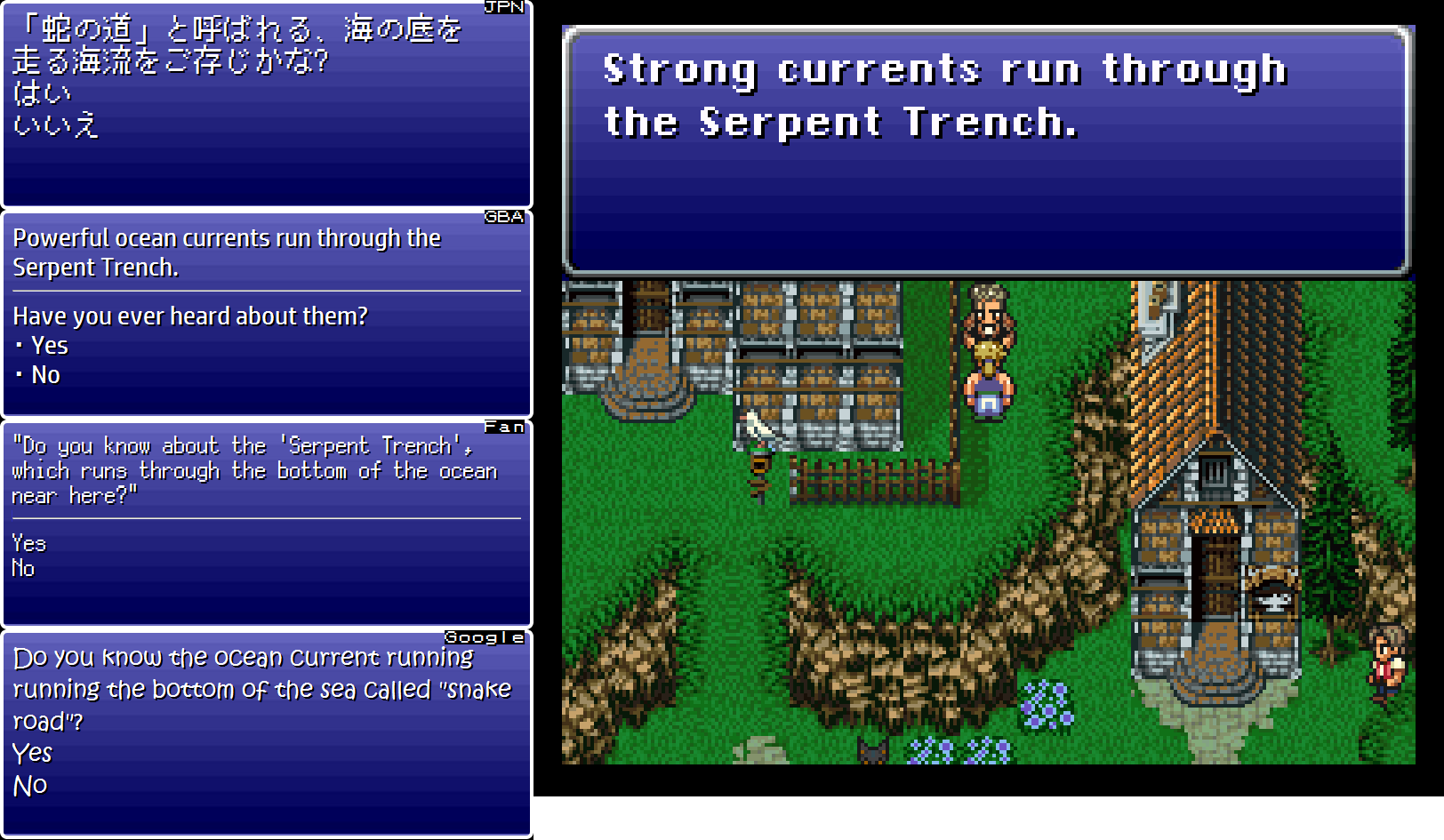
Some people mention an underwater current/path called the “Serpent Trench” in the Super NES translation. In Japanese, the name is 蛇の道 (hebi no michi), which literally means something like “Snake Road” or “Snake Path”.
For some reason I vaguely associate this underwater snake-themed path with the Devil’s Road in Final Fantasy IV, but upon closer inspection I can’t see why I have that mental association, besides the fact that they’re both special ways of crossing oceans.
Chatters in the stream mentioned that the Dragon Ball series has a road that goes by the same name in Japanese, and that it’s translated as “Snake Way” in English:
This got people wondering if the name might be based on some sort of mythology or something else. I’m not really sure myself – the only thing that comes to mind is a Japanese proverb: 蛇の道は蛇 (ja no michi wa hebi), which roughly means “it takes a snake to understand the way of a snake”. For more details on this proverb, see here.
Other than this snake proverb, nothing else comes to mind. But if you happen to have more info or know of any other instances of this word in Japanese entertainment, let me know.
Incidentally, one official Japanese guide translates the name into English as “Snake Deep”:
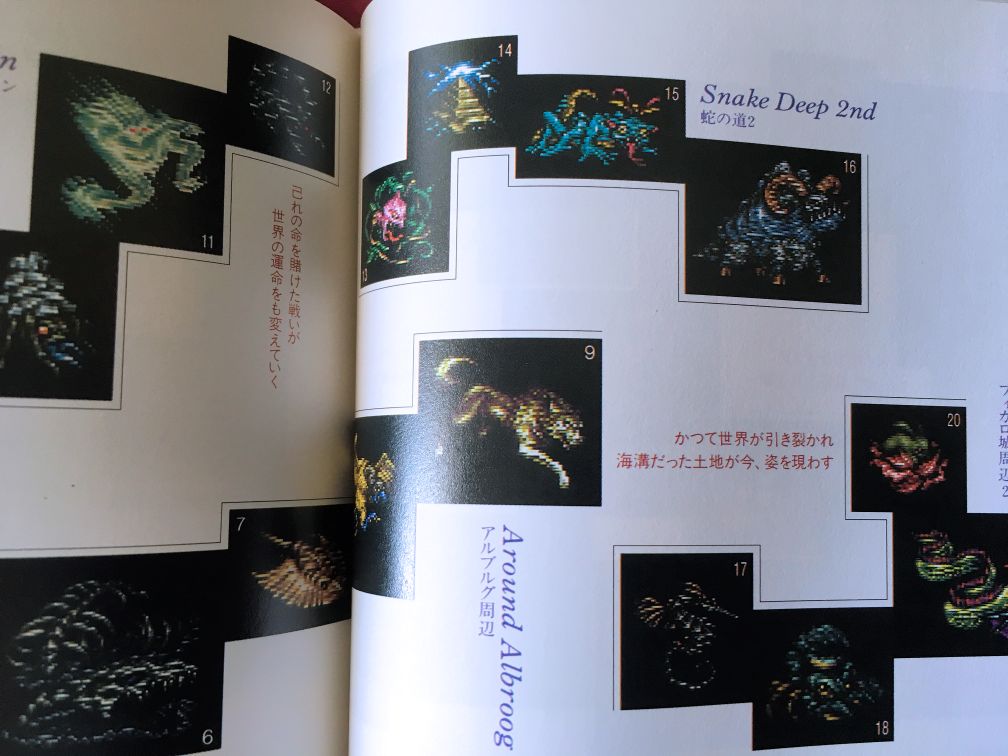
Katarin’s Name
There’s an NPC girl in Mobliz who plays a part in the story later. In Japanese, she’s known as カタリーナ (katarīna), which can be written out in English as “Catarina, “Katarina”, “Catalina”, and other variations.
In the Super NES translation, we first see her name as “Katrin”, but elsewhere she’s labeled as “Katarin”. So which name is it supposed to be?
The GBA translation follows the Super NES translation but cleans up the inconsistency problem by going with “Katarin” everywhere. The fan translation and machine translation go with “Catalina”.
Also, although it’s not a very big issue, note the usage of ellipses in each version in the second screenshot above. I’m somehow always fascinated by how punctuation gets handled by different translators from different times.
What’s Up with the Tintinabar?
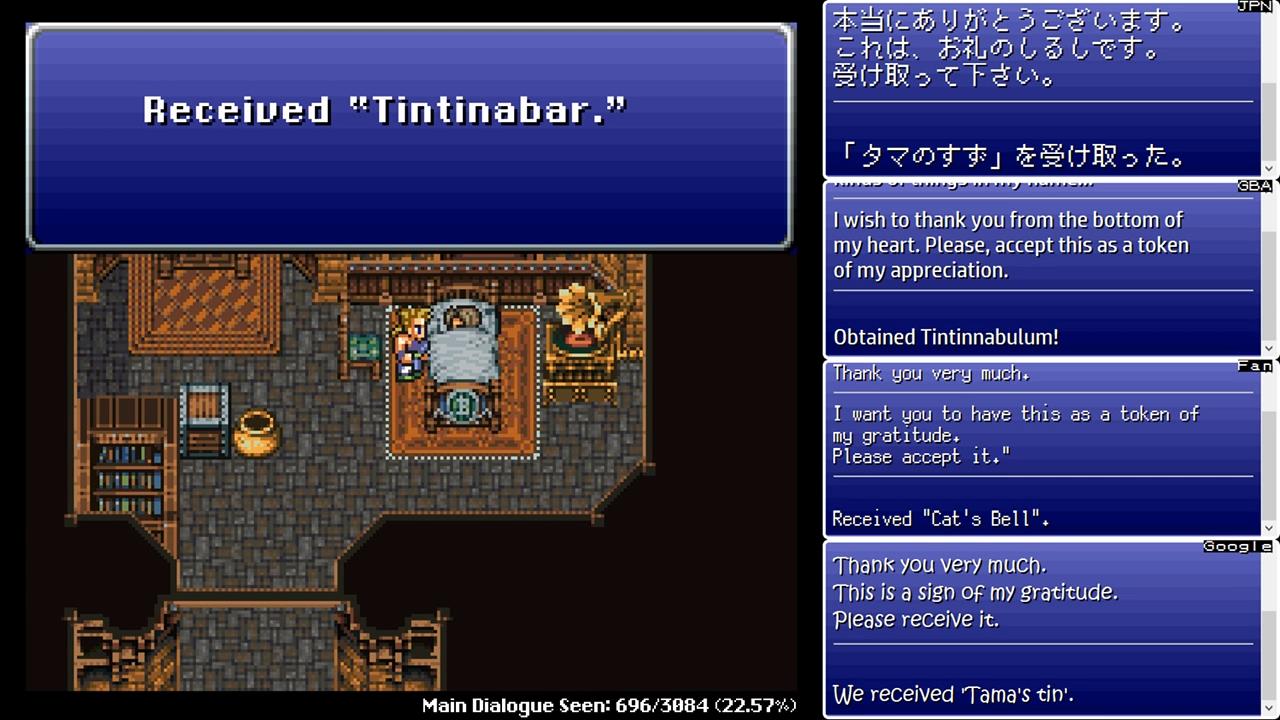
After doing a letter-mailing side quest, you can get a special accessory that restores a little bit of HP with every step you take.
In the Super NES translation, this item is known as a “Tintinabar”. I never knew what this word was, where it came from, or what it was supposed to signify. I was even more confused when I learned that it’s called the “Tama Bell” in Japanese. The “bell” part in the name is specifically the little jingly kind of bell, and “Tama” is a stereotypical cat name in Japan, which is why the fan translation goes with “Cat’s Bell”.
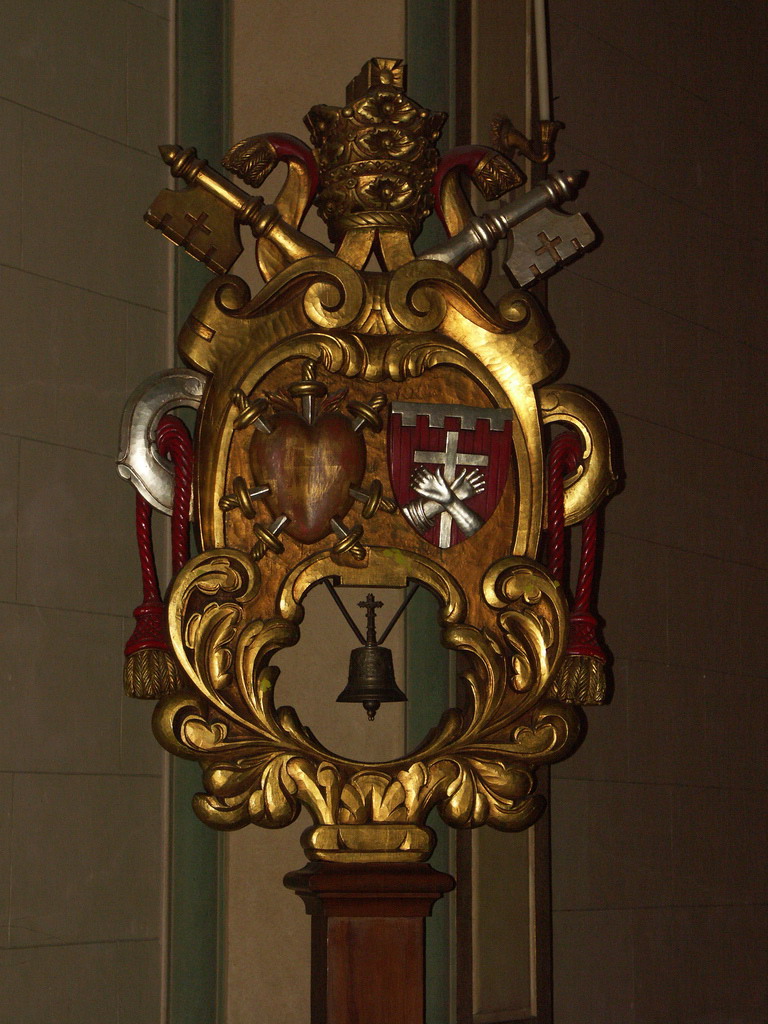
Still, it’s surprising to me that the Super NES translation would use such a fancy bell-related word here. I assume the name changed to “Tintinabar” due to name length restrictions, but I can’t help but wonder how it came about to begin with. Everything I’ve read has indicated that the Super NES translator had insanely tight deadlines and barely enough time to research simple Japanese words like “dinosaur”. So how’d this get in there? My best guess at the moment is that the translator saw the “bell” in the name, looked up “bell” in a thesaurus, and found the “Tintinnabulum” word there.
I don’t have a print thesaurus to check anymore, but out of curiosity I checked an online thesaurus and “tintinnabulum” indeed pops up in the top results:
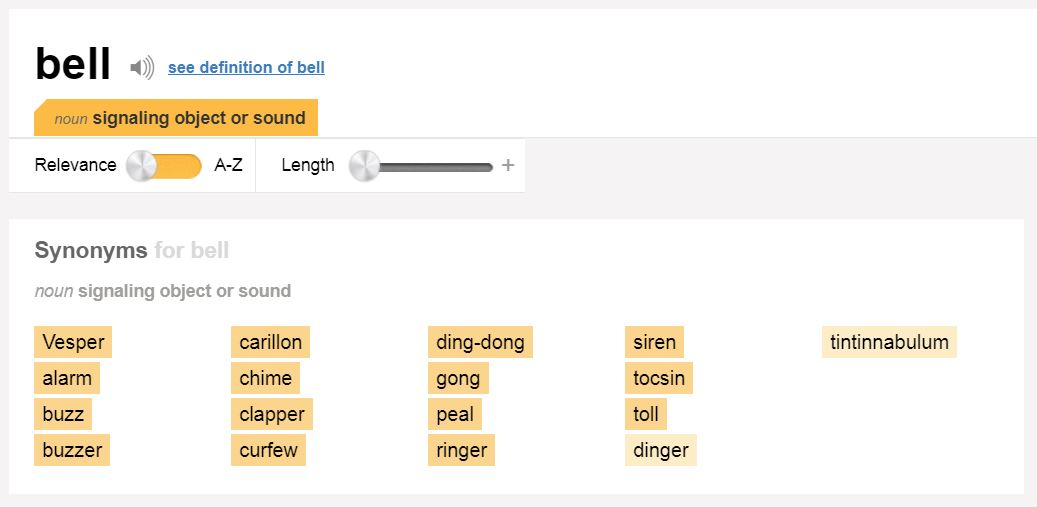
Translators are stereotyped as poring through dictionaries, but they also spend a lot of time going through thesauruses to get inspiration for names and to find just the right word for a specific situation. I spend a significant amount of time on thesaurus sites myself, so I feel it’s not outside the realm of possibility here. Or, of course, maybe the translator was simply familiar with the “tintinnabulum” word to begin with.
Making Gau Sounds
A new character named Gau shows up and joins the party. He’s a kid who’s been surviving on his own in the wild for years, so he doesn’t speak like a normal person.
In Japanese, he often just shouts, “Gau! Gau!” whenever he wants to say something. In the Super NES translation, this is changed to things like “Uwaooo~!!” to sound more animal-like, I guess. The GBA translation follows this pattern as well.
But at some point in the translation, this change from “Gau!” to “Uwaooo!” stops happening – he goes back to the original style of saying “Gau! Gau!”. My guess is that some scenes got extra attention post-translation and got edited a bit, including some instances of “Gau!”. But not every instance of “Gau!” got this extra attention, so those neglected ones remained unchanged.
On a side note, I included the “~” character in a few non-standard lines in the MOTHER 3 fan translation, like when a cow is talking, a frog gets possessed, or when a ghost is singing. A few people reported these as typos and insisted I shouldn’t have included the “~” since we don’t use it in English. But here it is in the official Super NES and GBA translations of Final Fantasy VI. So if you’re ever unsure about something like this, don’t let the punctuation patrol hold you back!
The Name is Mr. Thou
One aspect of Cyan’s samurai speech style is that he ends many of his sentences with でござる (de gozaru), which is an archaic word for “to be”, “is”, “are”, “am”, and other such things. It’s not the kind of word you use in normal, everyday Japanese speech – it’d be like if a Japanese student visited America and started talking like a medieval knight or cowboy or something. It’d be amusing at first but get weird and annoying quickly.
Anyway, Gau hears Cyan say de gozaru a lot and pokes fun at it by saying gozaru over and over. Eventually, for comical reasons, he starts calling Sabin by the name “Gozaru”. In response, Sabin always says stuff like, “No, he’s Gozaru, not me!”.
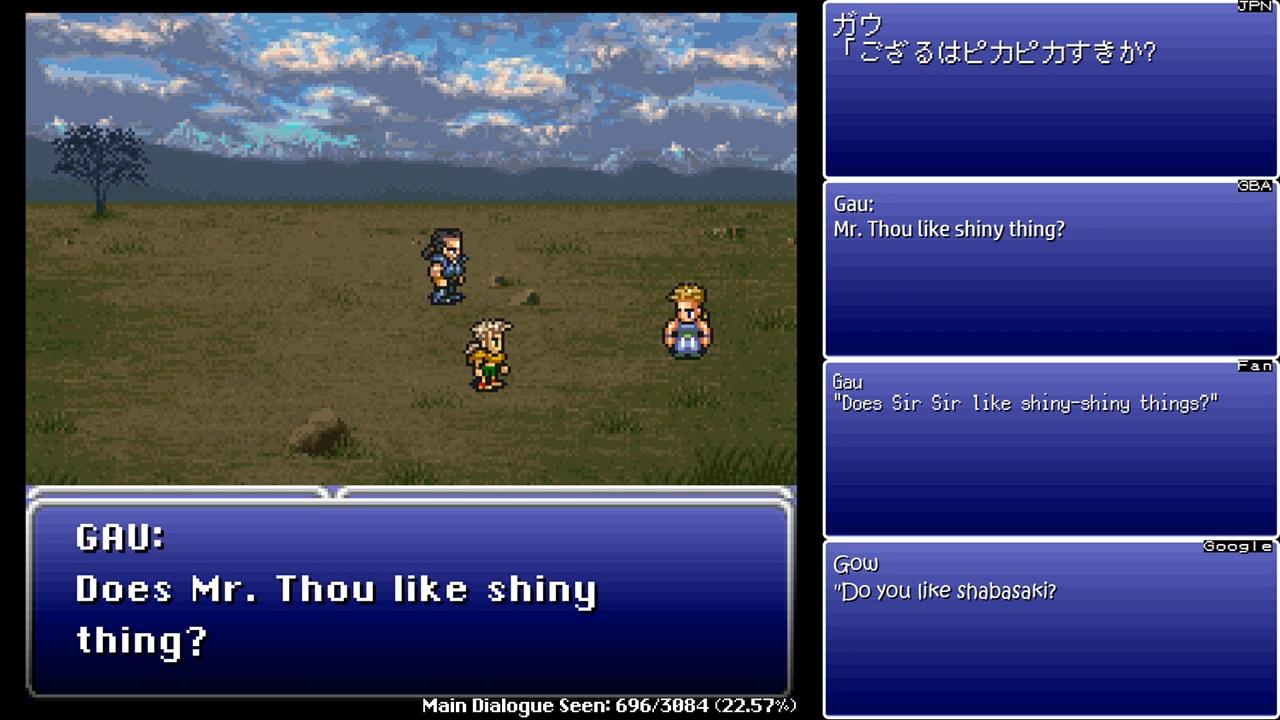
To make this work in English, the Super NES translator relied on the English word “thou”, which is an archaic word for the pronoun “you”. Cyan’s English text in this scene was filled with the word “thou” so that Gau could respond to it in the same way he responds in Japanese. Except now Gau repeats “Thou!” a lot and then eventually calls Sabin “Mr. Thou”.
The GBA translation keeps the famous “Mr. Thou” localization choice intact. The machine translation really struggles with the scene, going so far as to shout “Bastards! Bastards!” for some unknown reason.
The fan translator has so far struggled with Cyan’s speech style, which was confirmed by one member of the fan translation team in the stream chat earlier. By this point, though, it’s clear the fan translation script is simply replacing each instance of de gozaru with the word “sir”. As a result of this choice, there’s no “thou” or “Mr. Thou” stuff going on in the fan translation – Gau instead ends up calling Sabin “Sir Sir”.
On a separate note, whenever there’s a scene in Japanese entertainment in which someone references another person’s unique speech pattern, it’s common for English translations to suddenly magnify whatever equivalent speech pattern they’ve been given in English. And then, once the scene is over, those magnified speech patterns get dialed back down to the point that they sometimes become unnoticeable again.
If that’s a little hard to understand, this scene is a good example. The English translation requires Cyan to speak oddly here, so he suddenly starts using “thou” a lot more than he has before. After the scene ends, his speech quirks get toned down until his “thou”s and such are nearly gone. After that, he sounds only marginally different from other characters until his speech pattern gets the spotlight again.
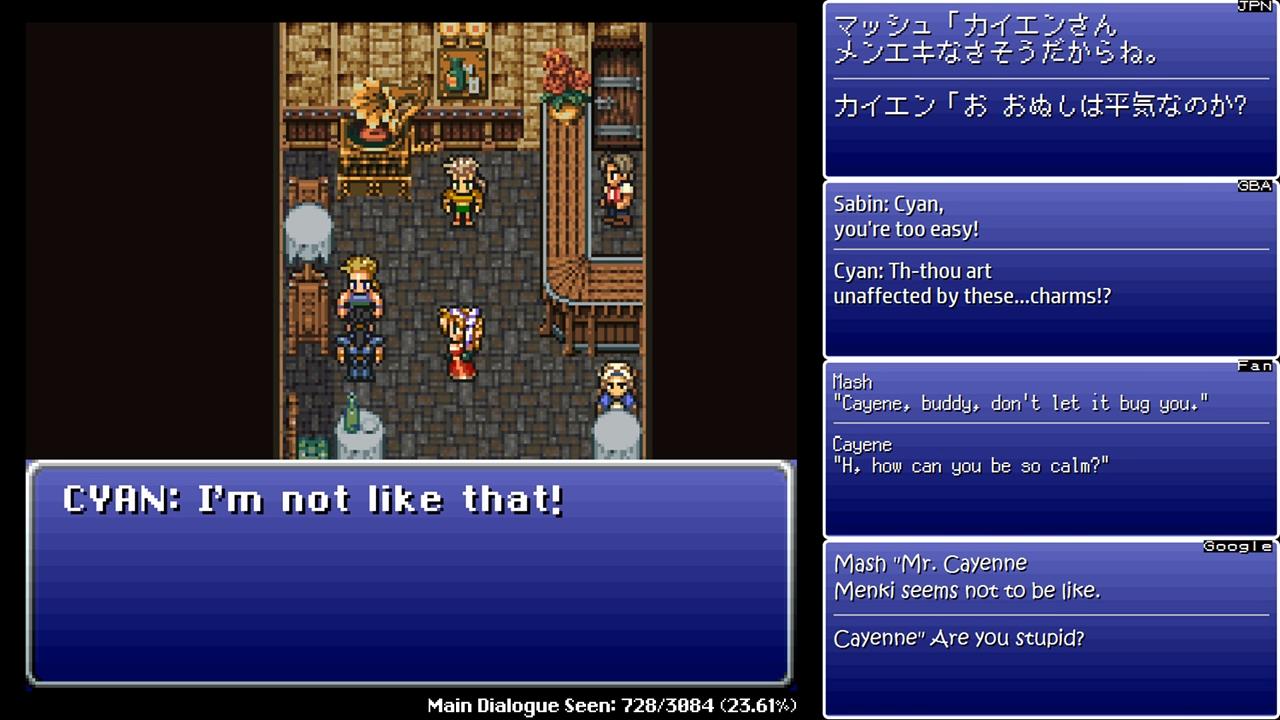
When I stop to think about it, I think this phenomenon is partly why more modern Final Fantasy translations feel different. They take characters’ speech patterns into account and strive to keep those characters in character at all times. It might sound easy, but when you’re dealing with dozens of characters across 50 to 100 hours of story, as well as DLC and such, it’s gotta be a taxing task!
Kappa the Imp
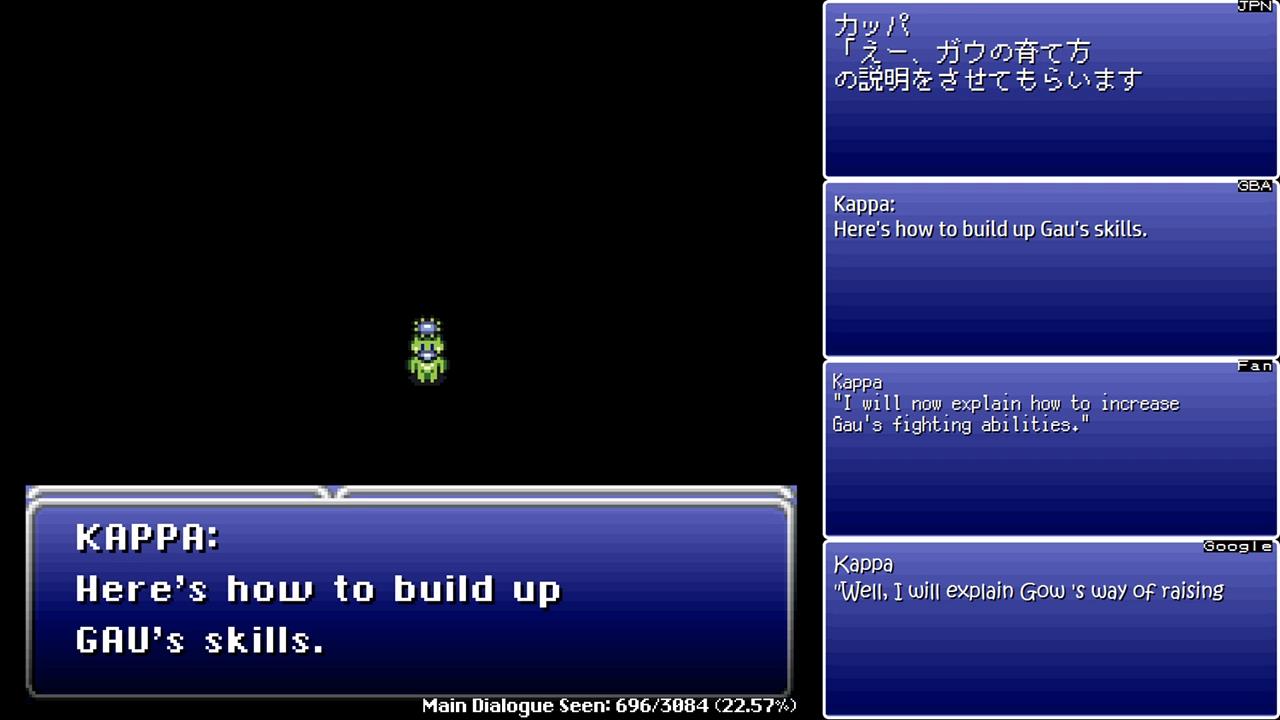
The “Kappa” status effect in the original Japanese game was famously renamed the “Imp” status effect in the Super NES translation, presumably because audiences outside of Japan wouldn’t have been familiar with Japanese kappa at the time. The GBA translation also keeps this iconic “Imp” change intact.
Oddly, I never noticed or must’ve forgotten that one of the “Imp” characters in the game is labeled as “Kappa” during a short scene after Gau joins the party. My theory is that it’s a leftover from a rough draft of the translation, when “Kappa” was still present everywhere, but got missed when the “Imp” change was made.
Whatever the case, the GBA translation also identifies this character as “Kappa”.
Fast Current
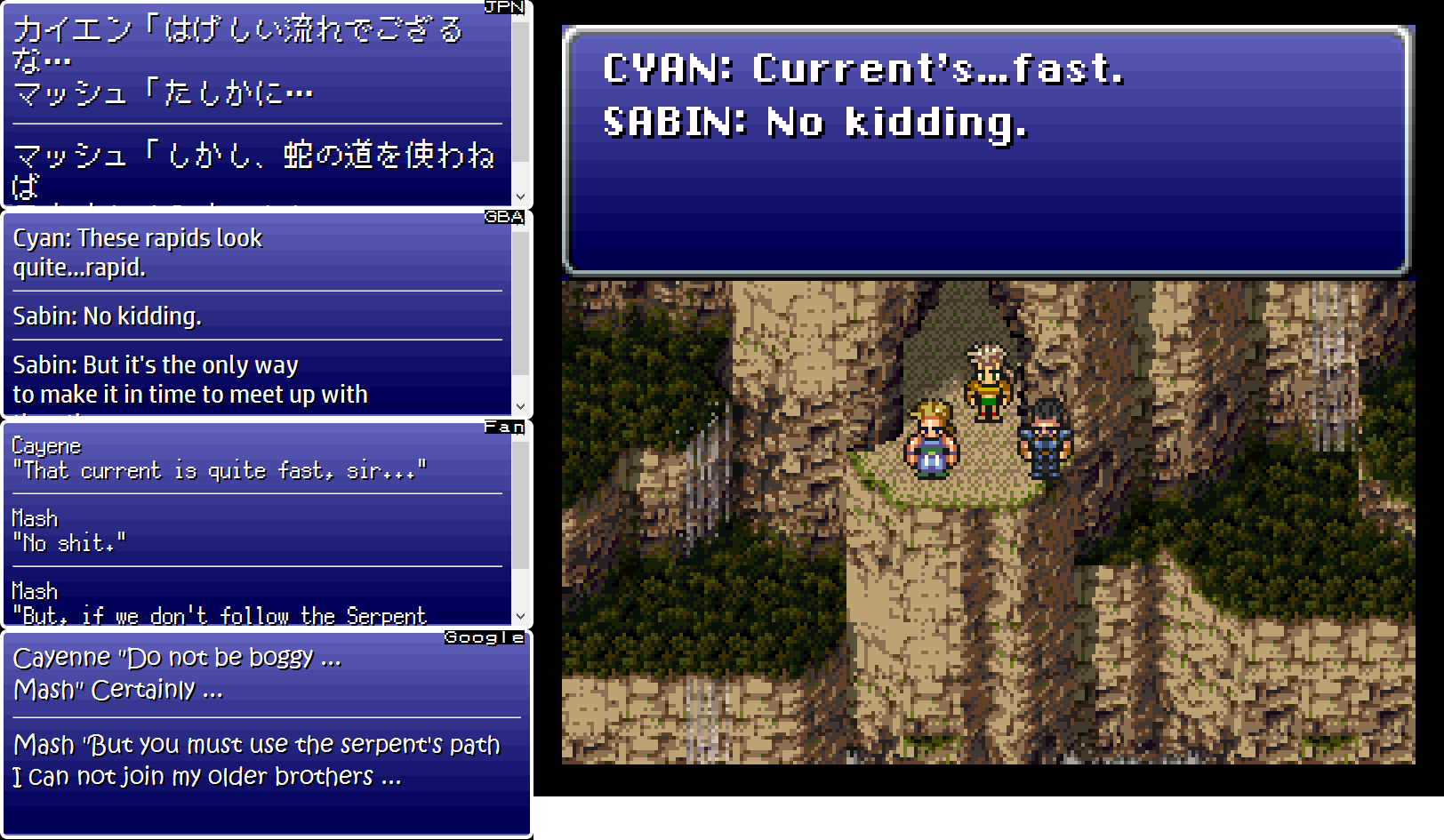
Cyan, Sabin, and Gau decide to jump into the underwater Serpent Trench in order to eventually reach Narshe. Just before they jump in, Cyan mentions that the water current looks very strong. In the GBA translation, this ordinary statement was turned into a small joke: “These rapids look quite… rapid.”
Sabin responds with a straightforward statement of agreement in Japanese. For some reason, he’s suddenly swearing in the fan translation: “No shit.”
Cyan Discovers Mature Content
In the city of Nikeah, there’s a woman dressed in a fancy gown in the pub/cafe. If you talk to her at this point in the game, she’ll try to flirt with Cyan.
In Japanese, she asks Cyan, “How about having a drink with me?”. As we’ve seen before, Nintendo prohibited alcohol references in the Super NES translation, so this line was changed to “How ’bout joining me?”
Cyan overreacts and scolds the woman. She isn’t about to give up, though, so she tells Cyan not to be such a party-pooper. Then, in Japanese, she says, “Here, have a peek at my cleavage.”
Again, Nintendo prohibited this sort of sexual content back in the day, so this line became “Geez, don’t blow an artery, baby!” in the Super NES translation. That strict policy had loosened by the time the GBA version was released, so the GBA translation puts the breast talk back into the script, but in a more creative way than the original text: “Hey, do you like these? I call this one Humpty, and this one Dumpty.”
Anyway, after the woman offers her cleavage up for display, Cyan reacts in Japanese with “C-c-c-c-cleavage?!”. This became “B…baby?!” in the Super NES translation, in response to the lady’s previous line.
As we can see, a whole bunch of mature content was clearly removed from the Super NES translation of this scene, so you would think that the fan translation guys would set their sights on this stuff and proudly uncensor it. Here are some quotes from the fan translation’s readme file, in fact:
Hence the goal of this release: To demonstrate to the English speaking folks how this translation should have been done. Hopefully the players will be able to enjoy this game like its meant to be enjoyed.
[…]I happened across Sky Render’s Domain and a hack to repair some of FF VI US’s censored, bullshitted, and otherwise massacared translation.
With all of this in mind, it’s extremely strange to see that the alcohol and sex talk remains censored in this scene. Let’s take a look at the first three lines:
| Basic translation | Super NES translation | Fan translation |
| Dancer: Hey there, stud. How about having a drink with me? Tee-hee. | Dancer: Yoo hoo! You handsome thing. How ’bout joining me? Tee hee! | Dancer: Hey, pops. Care to have some fun with me? Come on! |
| Cayenne: Wh-wh-what…?! Such debauchery! Cease this at once! | Cyan: H…how dare you… you licentious howler! | Cayene: W,w,w,w,w,why you slut! Get your hands off of me! |
| Dancer: Oh, don’t be such a square. Let’s have some fun. Here, have a peek at my cleavage. | Dancer: Geez, don’t blow an artery, baby! | Dancer: Stop being so stiff. You’ll enjoy it. Promise, boyfriend. |
The unusual translation choices in the fan translation lead me to believe that the translator didn’t fully understand the text in this scene (somehow “cleavage” became “boyfriend”) and/or that the fan translator chose to use the Super NES translation as a base and just rephrase things slightly: “joining me” became “have some fun with me”, and “baby” became “boyfriend”.
This rephrasing thing isn’t necessarily out of the ordinary for fan translations, though – the famous J2e fan translation of Final Fantasy IV was largely just a rephrasing of the official Super NES translation, for example.
Anyway, this is all to say that fan translations can have good intentions yet completely miss the goal they’re aiming for… without anyone else ever noticing for years.
Narche and Names
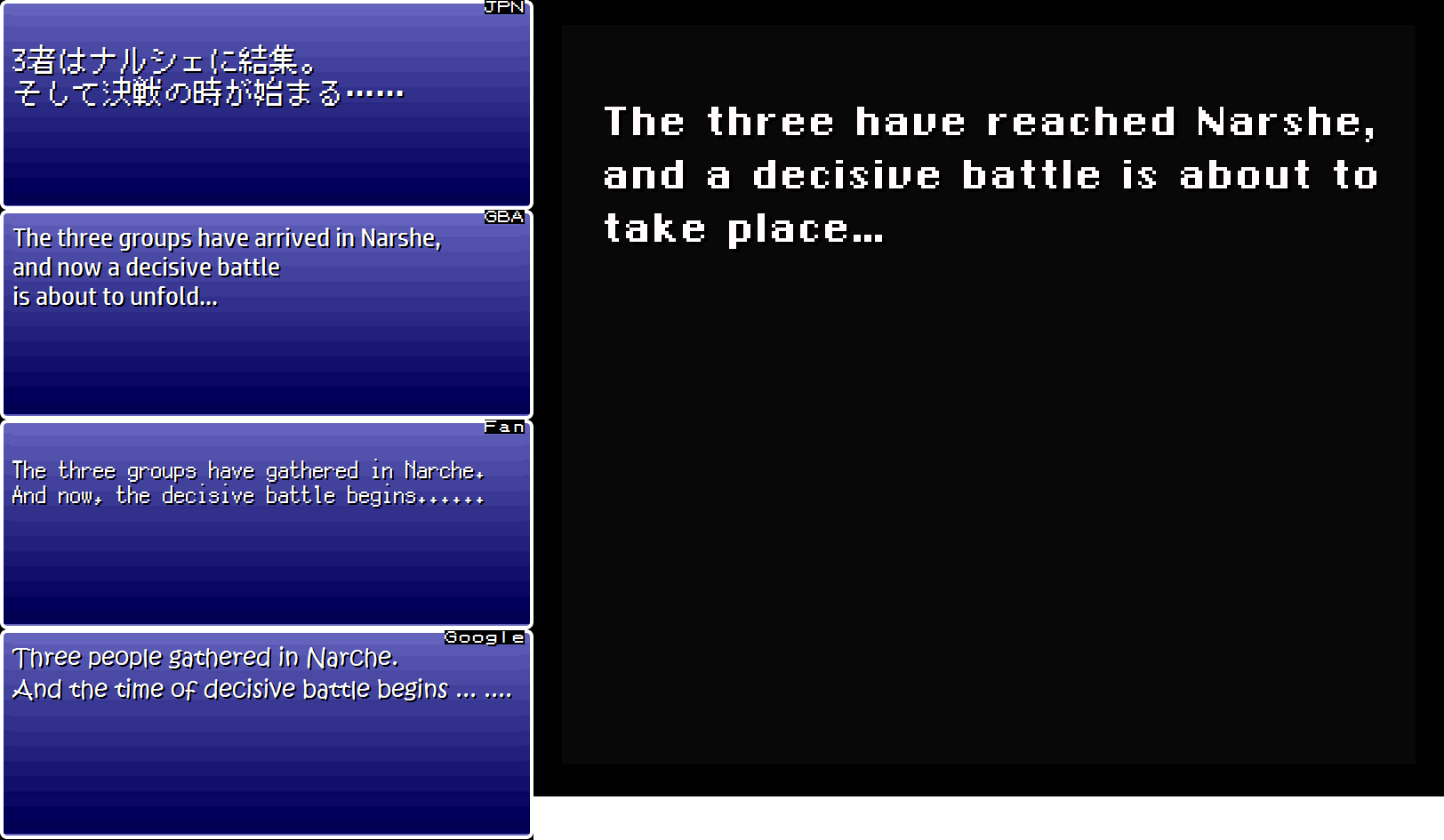
Back in Day 1 we saw that Narshe is spelled “Narche” in the fan translation. My theory was that it probably appeared as “Narche” in a Japanese strategy guide or some other secondary material – and that indeed appears to be the case. The fan translator also left a note about it in the readme file:
Some names in the translation might provoke a few raised eyebrows. […] Another one is the town of Narche, which is pronounced “narshay”. It’s spelled the way it is because it was originally meant to have a French feel to it.
Anyway, as I surmised, it’s indeed spelled “Narche” in one of the official Japanese guides. But it’s also spelled “Nalsh” in another official guide that’s part of the same set:
As I’ve mentioned previously, Japanese guides and secondary merchandise can be useful for trying to determine how Japanese names should be spelled in English. But this sort of conflicting name problem is very common with Japanese guides and merchandise, so as a translator you slowly build up an extra sense of when such English spellings can be trusted and when they should be considered unsafe to use as-is. Translator street-smarts, basically.
With all that said, the fan translation’s use of “Narche” seems perfectly reasonable to me. Both “Narshe” and “Narche” are acceptable spellings, but I somehow feel “Narche” would’ve caused even more pronunciation confusion.
Sabin’s Weird Line
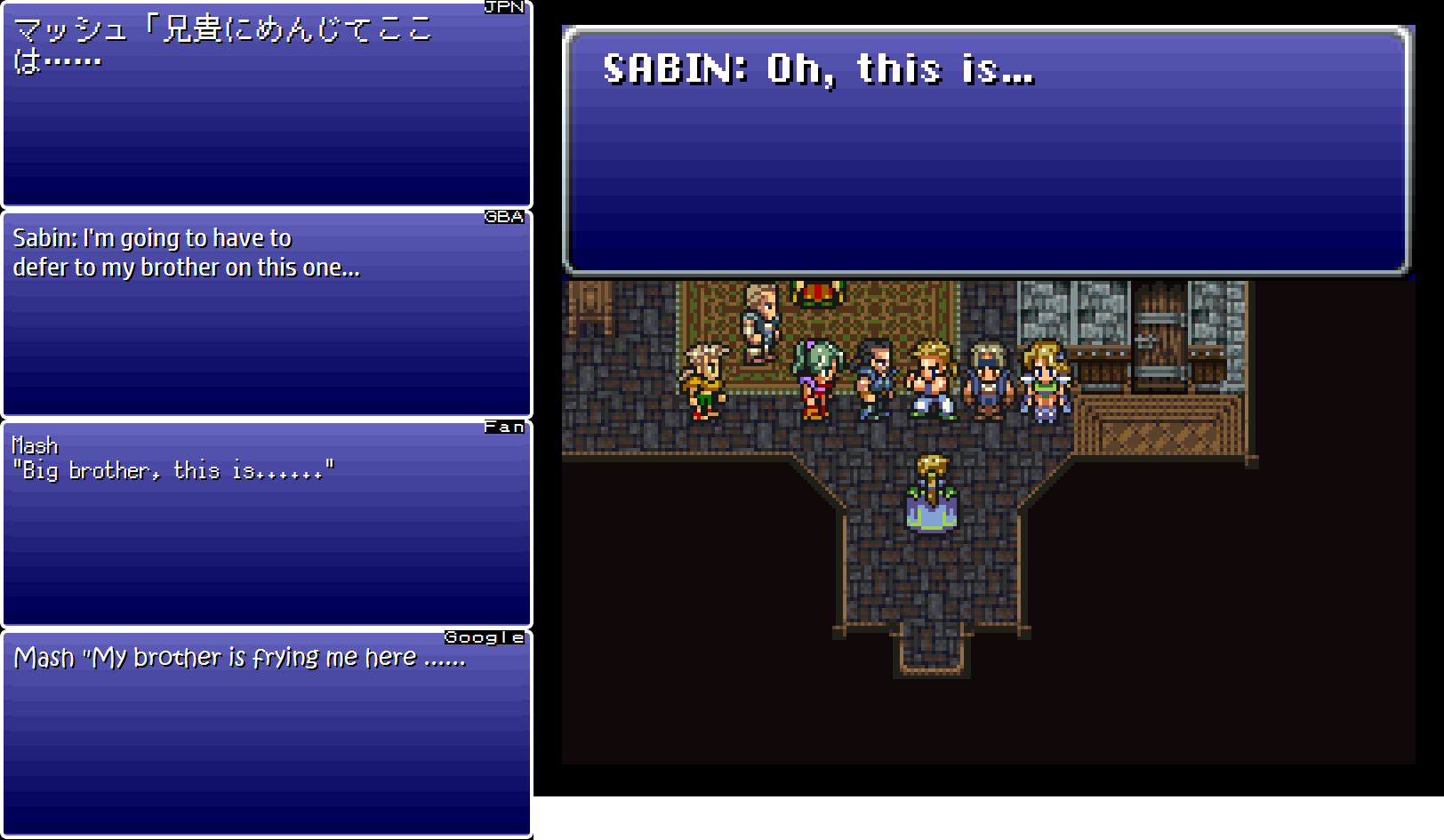
The separated party members finally reunite in Narshe just as the Empire is about to attack. During a strategy meeting, Sabin has a strange line in the Super NES translation that has caused confusion for decades. For some reason, out of nowhere, he interrupts a conversation and says, “Oh, this is…”.
I wrote about this line in detail in this old article. Someone in the comments noticed that the text “Oh, this is…” also appears just moments before this line, so it’s very likely that there was a bug that caused Sabin to repeat the line here.
Magical Reunion
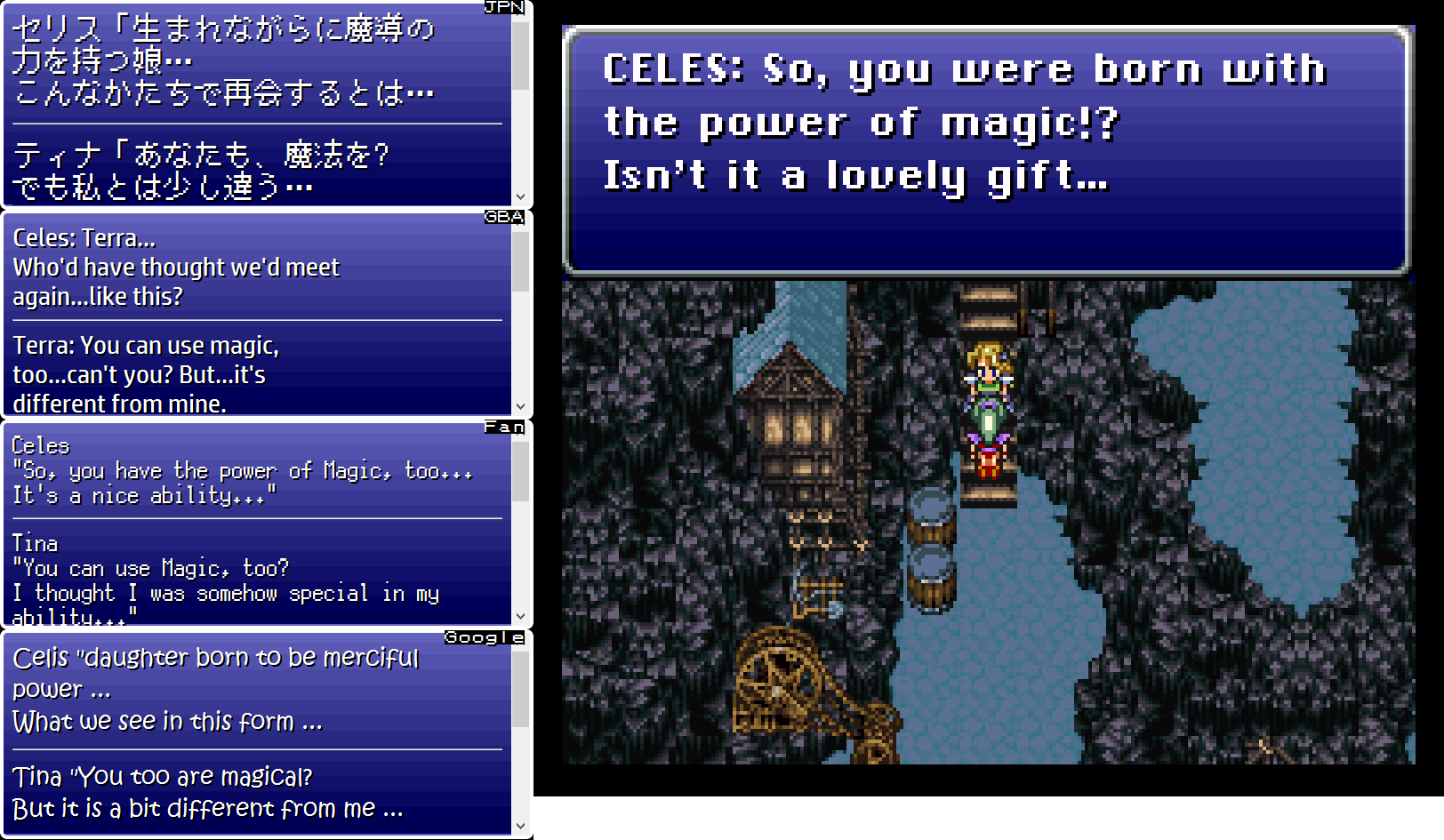
In the Japanese script, Celes clearly knows Terra – she even mentions that she never expected them to meet again in a situation like this. The Super NES translation changes this entirely and replaces it with something else that indicates the two have never met before until now.
It’s also clear in the Japanese version that Celes already knows that Terra can use magic, yet the replacement line in the Super NES translation ends up suggesting the exact opposite.
Basically, some backstory got messed up in the Super NES translation, but the GBA translation fixes it. The fan translation is based off of the flawed Super NES translation, just rephrased.
Frozen Esper Stuff
Something I brought up during the Day 1 stream is that some of my old Japanese magazines include a pre-release image of a different Esper – the one that turns out to be Terra’s father – in the block of ice at the beginning of the game. Here’s a look at it:
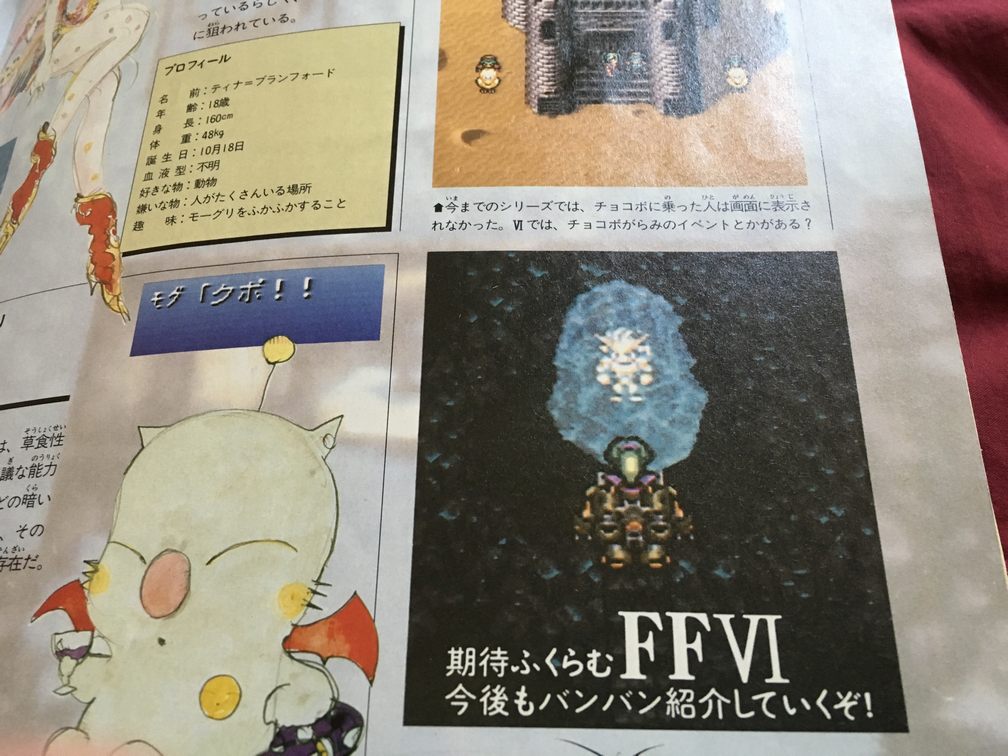
That’s from the December 10, 1993 issue of Marukatsu Super Famicom. About a month later, in the January 21, 1994 issue, the Esper was switched to what’s in the final version. One of the image captions in the magazine even notes that it changed in such a short time.
I bring this up because I have a weird theory that I thought up just now, while typing this article. It takes a little explaining though.
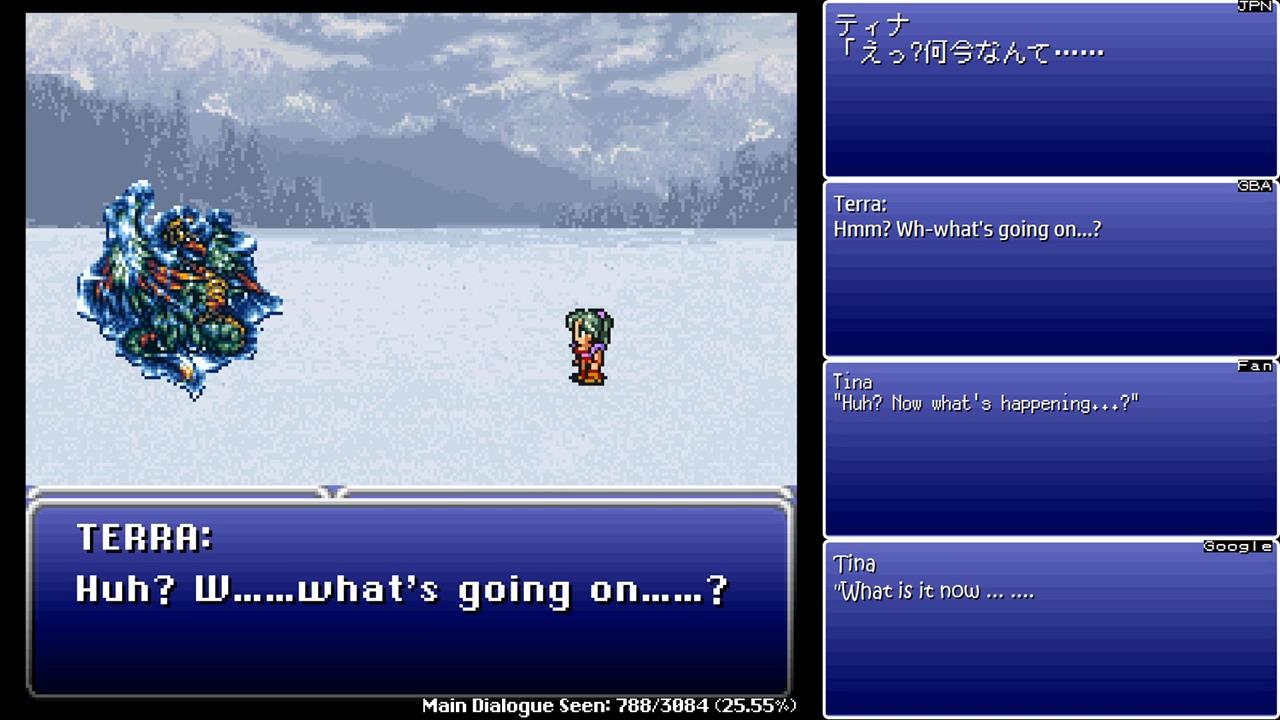
In this key scene, Terra finally comes face to face with the frozen Esper again. At one point, Terra says in the Super NES translation, “Huh? W……what’s going on……?”
This part (and a similar part in the introduction) always felt kind of odd to me, and it turns out that in Japanese she actually says something like, “Huh? What did you just say…?” or “Huh? Did you say something…?”. Basically, it’s implied that she’s hearing some sort of voice. Presumably, this is why she starts talking back to the Esper and asks it questions immediately afterward.
The Super NES text makes kind of a big change here for no real reason, so I wonder if the Japanese line is a leftover from when Terra’s father was in the ice – after all, it’d make more sense story-wise for him to try talk to Terra. But, because the change to the Tritoch Esper was so last-minute, this Japanese scene didn’t get updated.
If this was the case, then it might explain why the Super NES translation changes the line entirely – even if there wasn’t time to fix the line in the Japanese release, there was still plenty of time to fix the line before the translation’s release. And this is possibly why the frozen Esper no longer talks to Terra in this scene in the Super NES translation and the GBA translation.
Of course, this is all kinds of guesswork that I’m not even sure about. But if a beta version of the Japanese game ever gets out, I’d definitely want to check out this frozen Esper stuff!
After Her
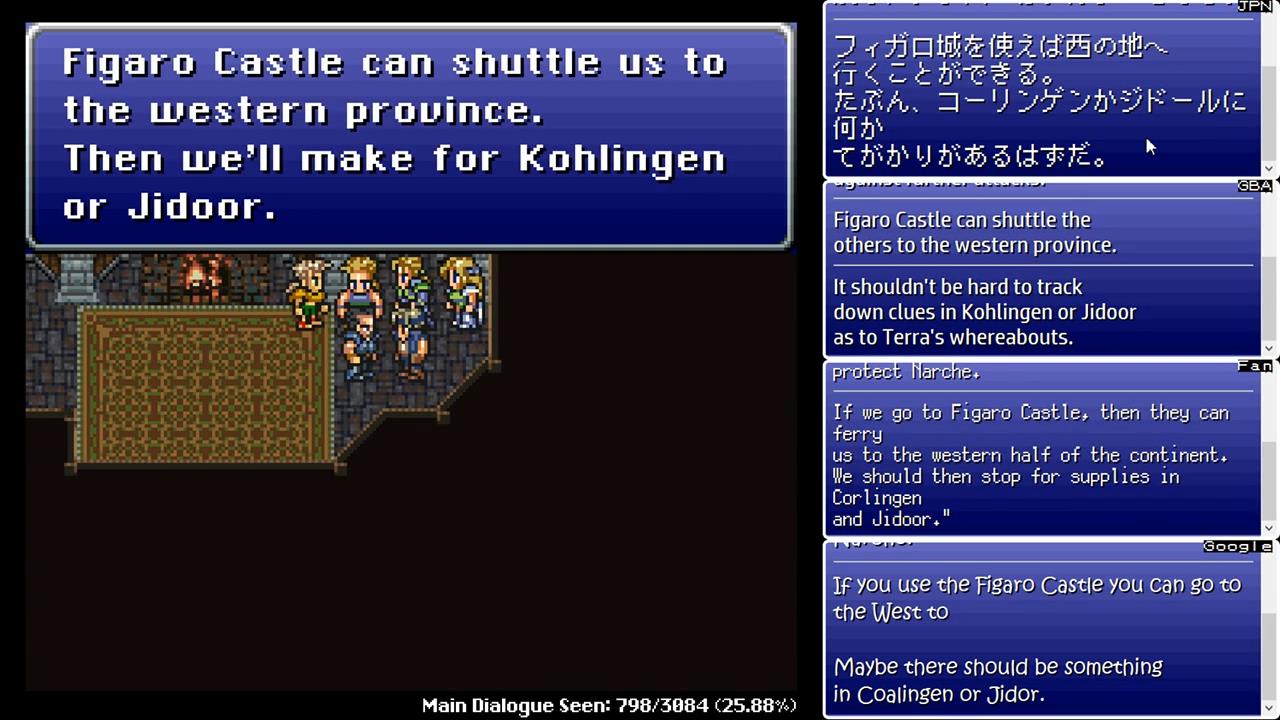
Terra transforms into some sort of berserk creature and flies off to the west. The heroes discuss what they should do next and how to find Terra.
In Japanese, Edgar says: “We should be able to find clues about her whereabouts in Kohlingen or Jidoor.”
In the Super NES translation, the purpose for visiting Kohlingen or Jidoor is dropped – the player is told where to go next, but not why exactly. Maybe it was an oversight or maybe the translator felt that players already understood why, although though these town names have never been mentioned before.
The GBA translation fixes this potential mistake, but the fan translation goes the other direction and messes up the purpose of visiting Kohlingen and Jidoor even more than the Super NES translation. In the fan version, players are asked to visit these towns to stock up on supplies, not to search for Terra.
Ultimately, this issue doesn’t matter too much – you pretty much just go where the game takes you. But it’s always nice to have a proper goal pushing you forward too.


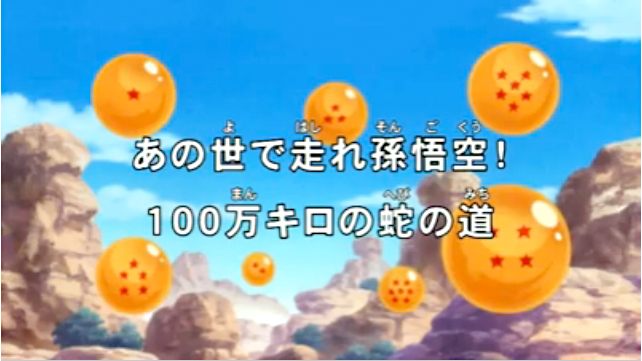
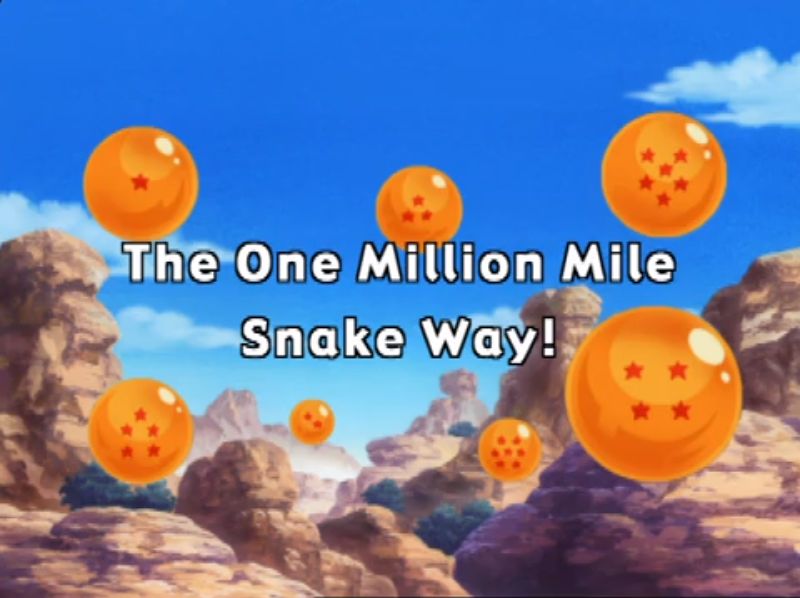
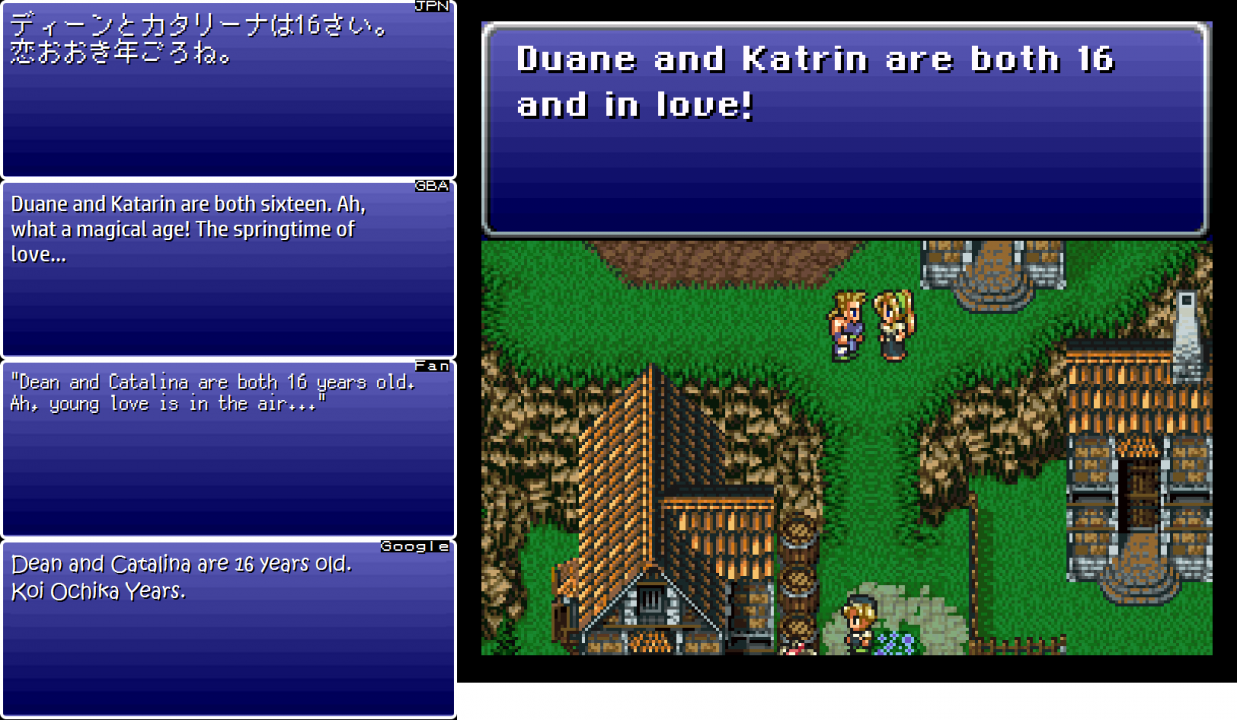

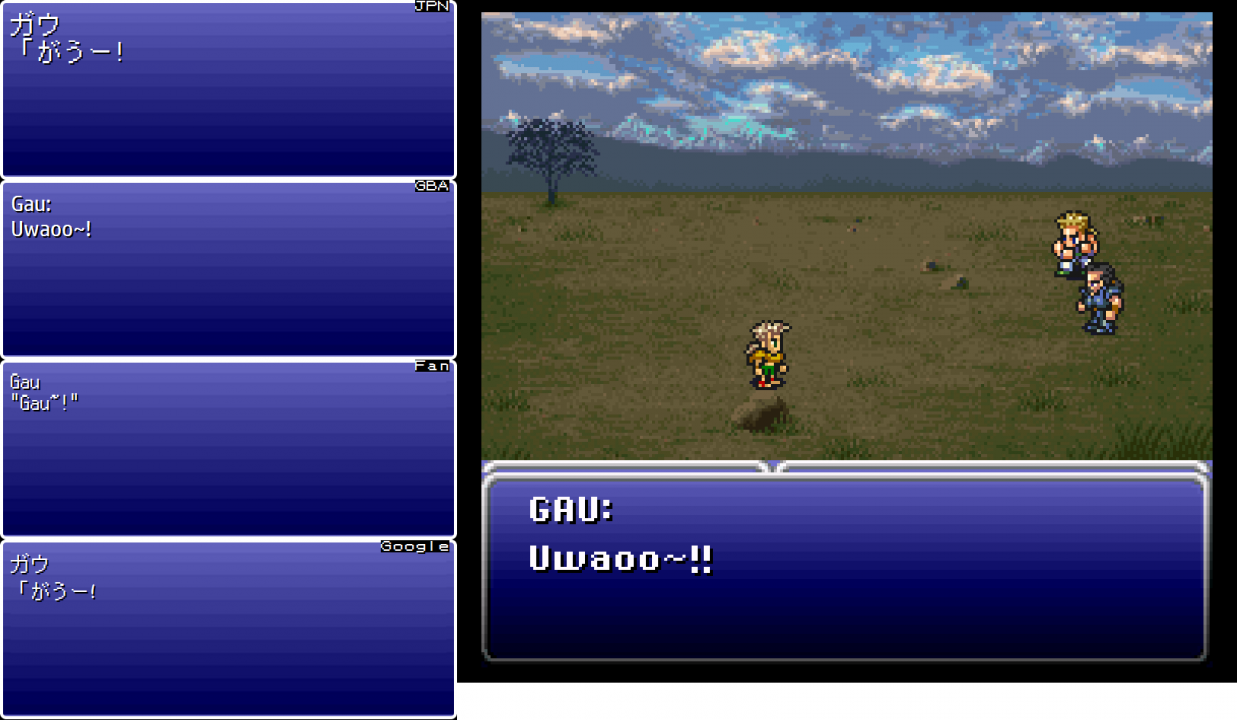
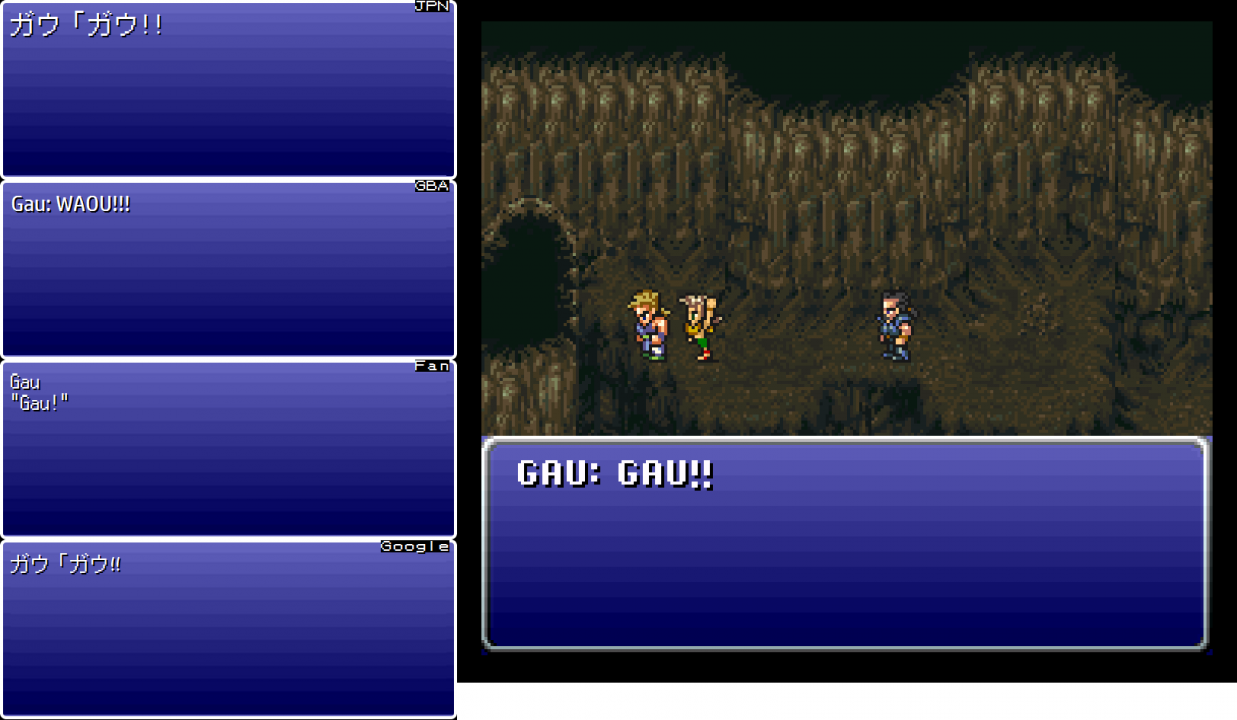
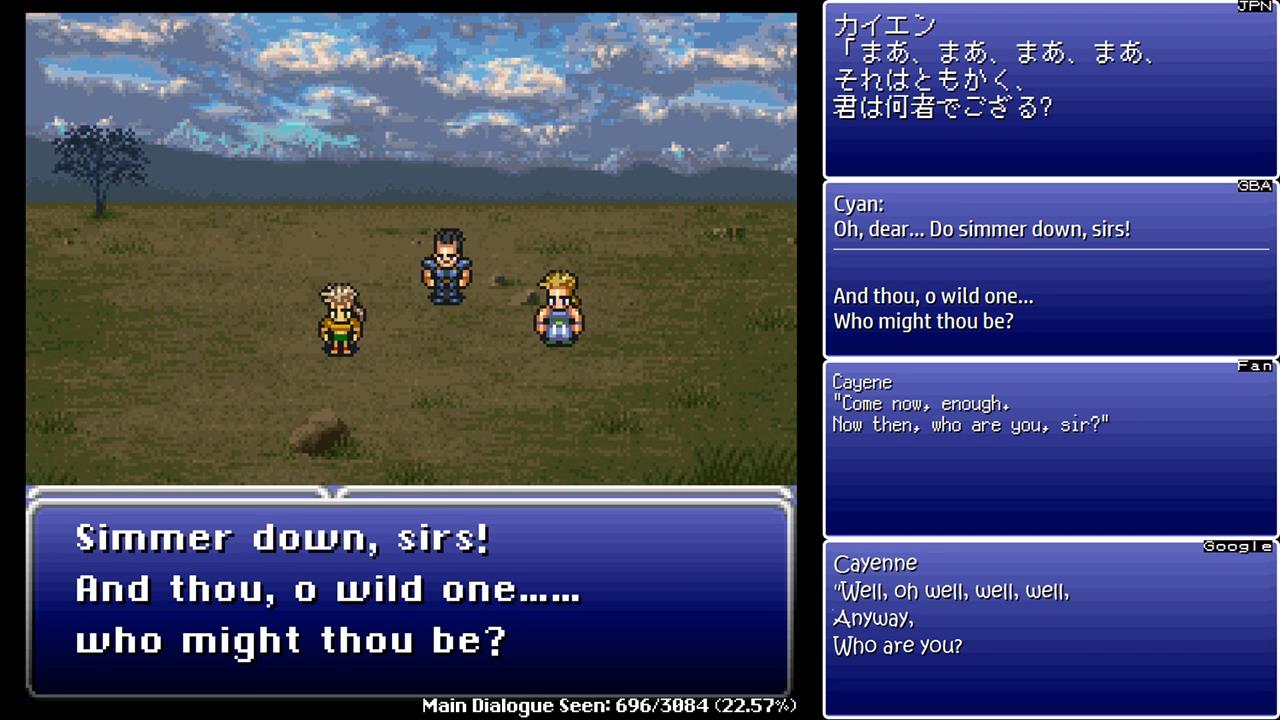
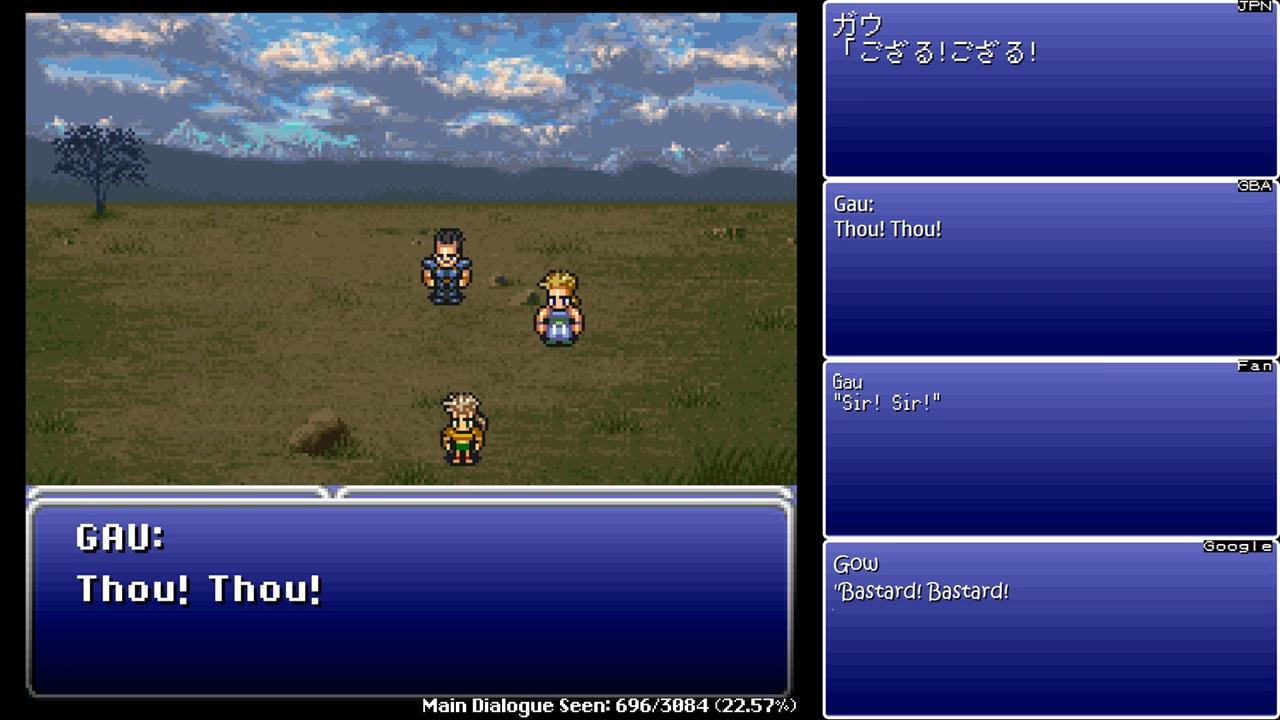
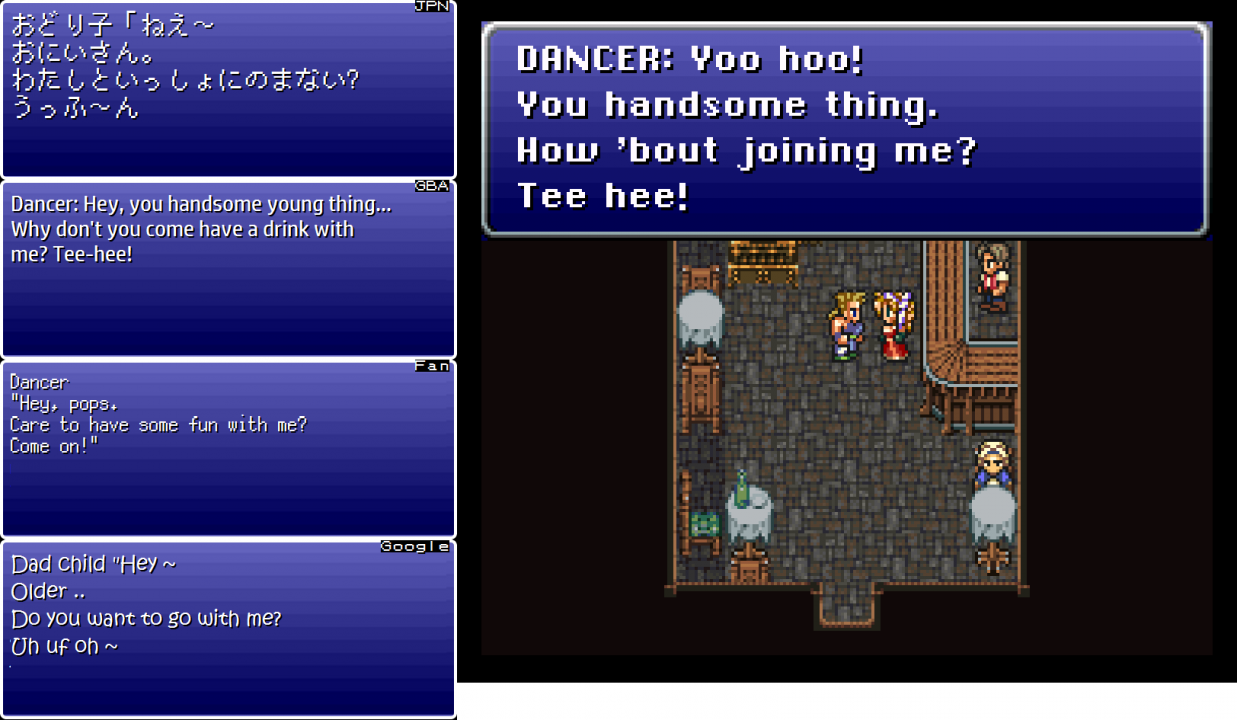
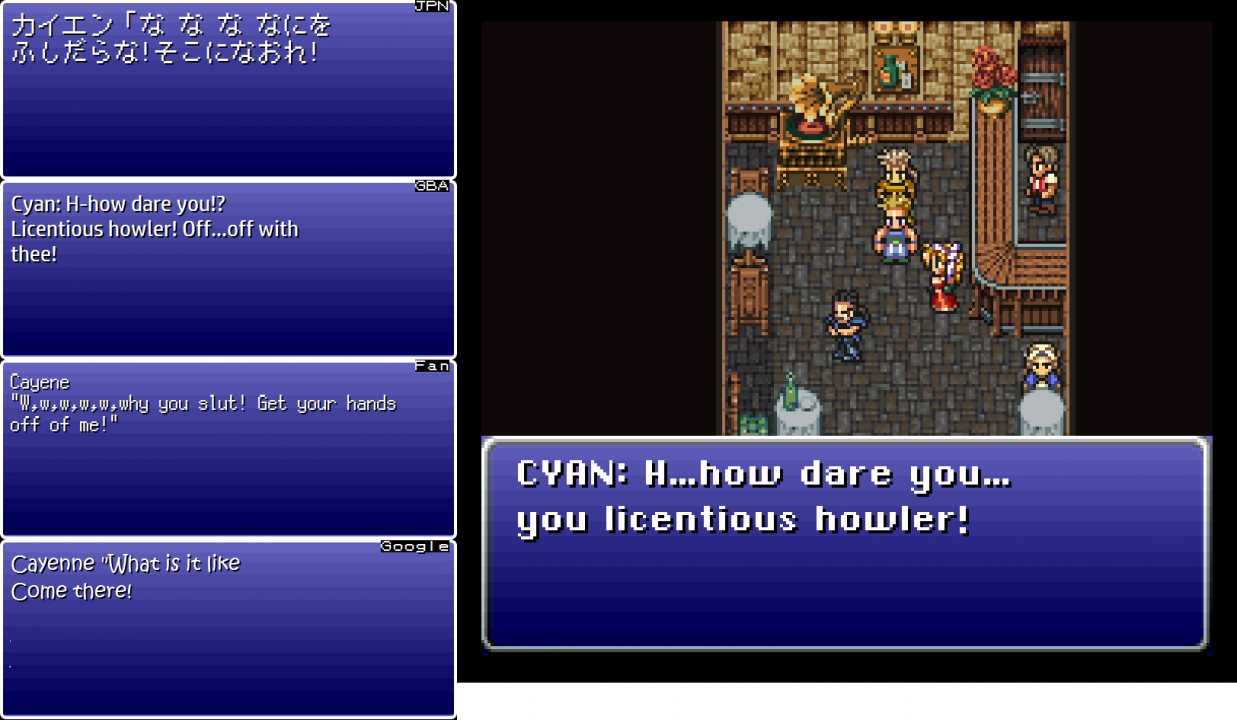
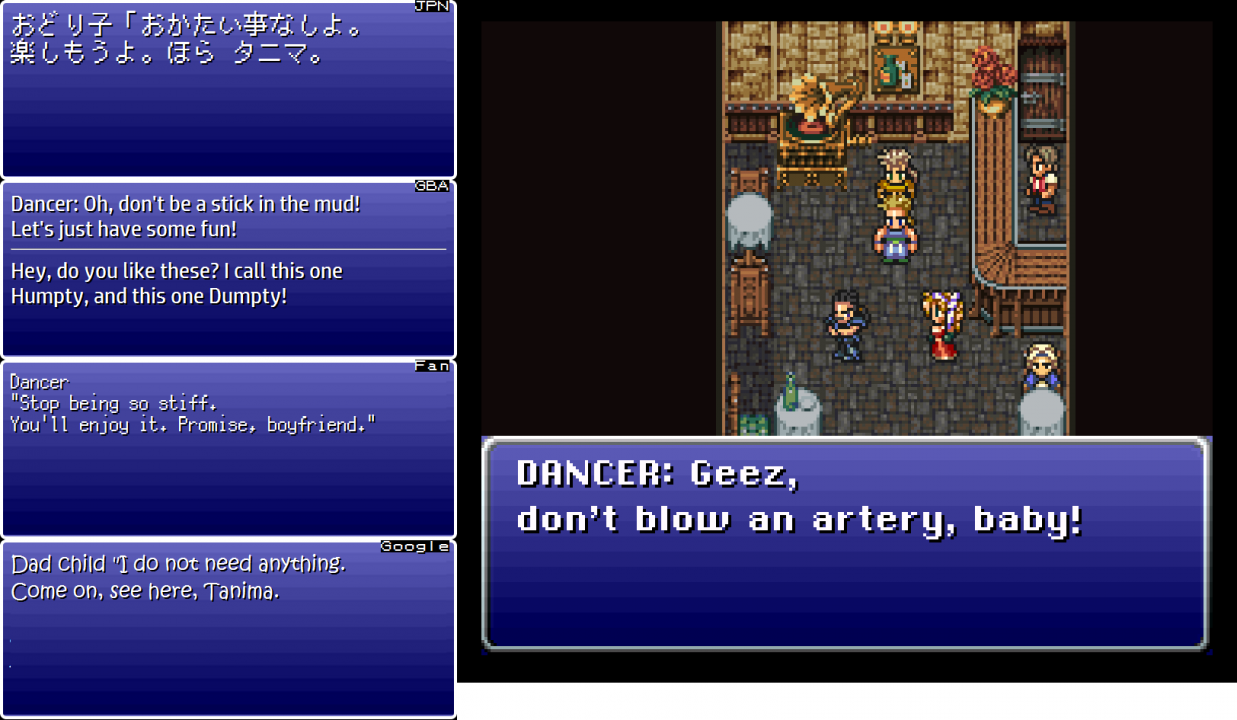
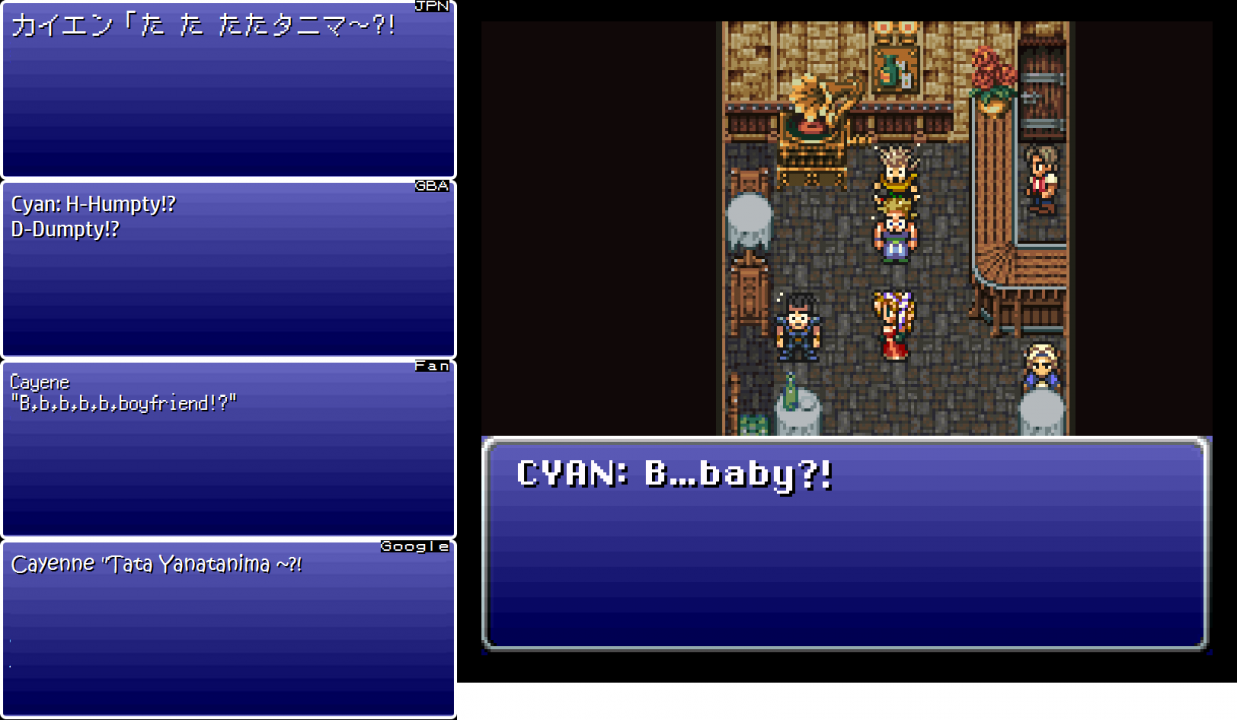
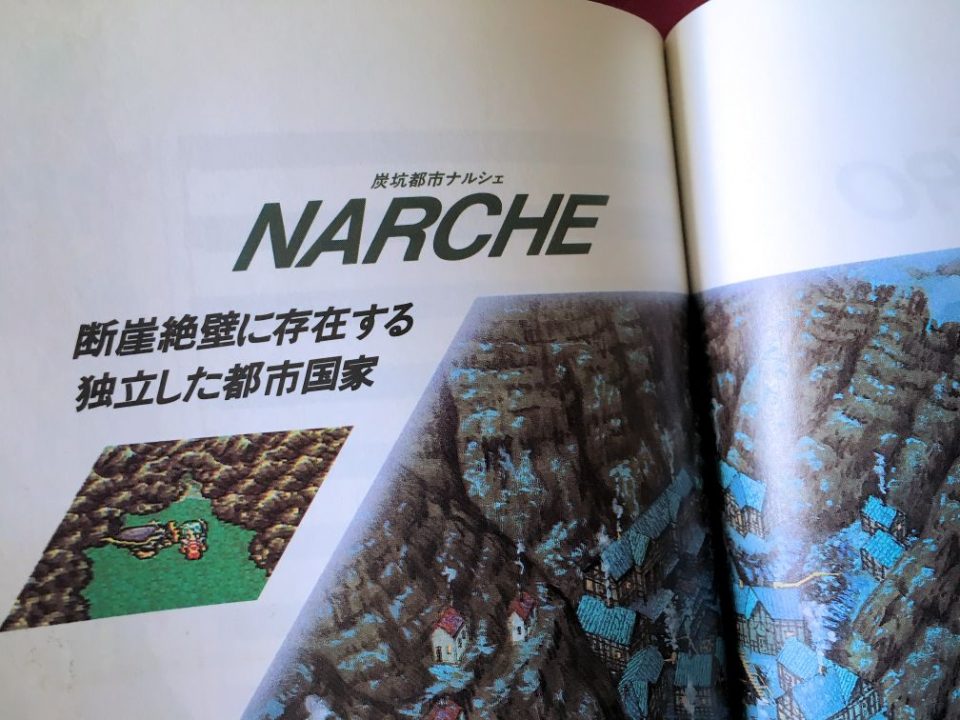
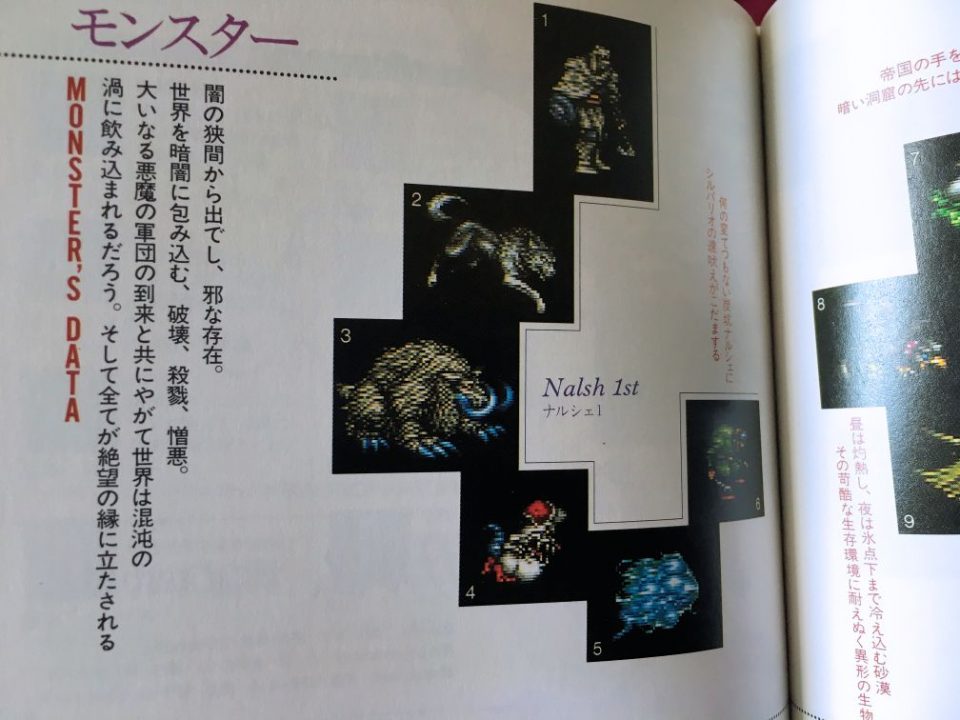
![press start to translate [Final Fantasy IV] press start to translate [Final Fantasy IV]](https://legendsoflocalization.com/wp-content/uploads/2019/08/bbenma.png)
Speaking of character’s speech quirks being amplified for a scene where they’re important, I’m reminded of FFVII, where Cait Sith is unmasked because of his speech quirks… but the localization team forgot to include either quirk in the scene in question, so he ends up being unmasked for no reason at all!
Meant to mention this in the stream, but couldn’t get my thoughts together on it…
I understood back then what the Tintinabar was going for specifically because I’d seen Edgar Allen Poe’s poem “The Bells” referenced in school, in which he coins the neologism “tintinnabulation” for the sound of bells ringing. I kind of suspected it was meant to be a portmanteau of that and “bar” or something… i.e., a bar that rings.
In hindsight, Kitty Bell would’ve worked…it fits within the space limit and gets across the “cutesy” feel of the item. I’m confused as to why Slattery chose to stick with a relatively unknown word.
I remember in the play A Funny Thing Happened On The Way To The Forum, there’s a dancer named Tintinabula, so called because she dances with bells. Don’t quote me on the spelling though.
Which probably contains another joke entirely, as in Ancient Rome a tintinnabulum was a *very* phallic-looking wind charm.
“Tintinabar” is a Latin first-person singular imperfect passive indicative conjugation of the verb “tintinare” (to ring). I guess one way to express that in english is with the phrase “I was rung”
Tangent based on the “Tintinabar”: I really don’t understand this concept of keeping weird/odd sounding names or lines in retranslation just because the fans are used to it/turned it into a meme/etc. (It’s the same reason why I dislike the “spoony bard” line from FF4, for example).
Translating “tashikani…” as “No shit” for no reason is really the quintessence of fan translations.
‘Narche’ is used in the FMV intro of the PS1 release: https://youtu.be/DmMsgZgAebM?t=1m52s
Maybe the reason they had Terra say “Huh? W……what’s going on……?” is because someone talking in your head would come across as incredibly strange and would make you want to question the situation. It might also be because they wanted to make it clear that the connection with Terra and Espers is that much more mysterious and didn’t want to spoil the part where you reunite with Terra in Zozo and learn Espers can talk like humans. I don’t know if the translation for the SNES version was thinking that far ahead though, it’s just a theory.
I always felt Cyan’s accent was already treated as offhand in SNES since he’s the only one in Doma who had that accent there. When I first played it gave me the impression that he was faking his accent. Even the king didn’t sound that way and Cyan dropped his accent at random moments so it had to be fake, right? Teenage me had some interesting thoughts.
You probably associate the Serpent Trench with the Devil’s Road because the latter’s name was “Serpent Road” in the original English SNES release of FF4. I made the same connection as a kid, so you’re not alone there.
I imagine the idea is that Gau is called that because it’s the main thing he says, so changing every instance without changing his name would be problematic.
For whatever reason, I tried putting the “Bastard! Bastard!” line into Google Translate, and it came back with
Gow
“Thank you!
And if you take out the 「, it becomes “Bamboo! Bamboo!” So… Yeah.
I’ll never understand why Japan thinks it’s okay for young boys to play video games with any mention of boobs and other naughty behavior. I don’t think little kids need to learn what a woman’s cleavage should feel like.
Considering this game has heavier use of kanji, this was probably not targeted at “little” kids who wouldn’t be able to read them. More likely aimed at adolescents, at the earliest.
I’ll also never understand why some people gloss over stuff like genocide in media but get irked the moment something sexy shows up. Violence is apparently not as often naughty or inappropriate as sex is.
I’m not irked, I just find it odd they play around with idea of boobs and ladies’ undergarments like it’s okay. I don’t find violence or genocide cool either, in case you’re making presumptions about me. What you said does bring up a point about the U.S. and Japan’s TV censorship differences.
Japan
Boobs = Totally okay
Violence = Bad
U.S.
Boobs = Bad
Violence = Totally okay
Yes. It’s the exact same logic as most of the rest of the world finding it odd that Americans in general have no issues with their children watching violent slasher movies as long as they don’t have any nipples and curse words in them. Don’t be judgmental about other cultures if you take offense at people pointing out that those cultures feel the same way about aspects of your own culture.
It’s a difference of culture. Obviously you’ll never understand it if you weren’t raised there. And really there’s no need to.
Regarding changes in speech, from your own overviews, it sounds like there’s a first pass writer that translates everything generically, kind of like how old ROM hacking groups took text dumps to students learning Japanese. Then I guess there is a second round that “punches up” the script at key moments.
Regarding Kappa, it took me a while to decouple the Twitch emoticon/meme from the FFVI character.
“Japanese English” to “Regular English” has been a long standing problem. Examples from Dragon Ball Z are saiyan vs. saiya-jin and Krillin vs. Kuririn. While one set of fans insisted on the latter, the former spellings appeared in the actual show.
Now I’m curious–are there any fan translators out there who advertise their works as “more accurate” and DON’T make a lot of mistakes? I’m not an accuracy wonk except in where it impacts playability, but I’m getting the sense that a lot of fan translations are pretty… loose with the original texts they adapt.
I think the issue is really that it’s much easier to recognize references to controversial subjects in the original Japanese than it is to translate whole conversations and preserve the subtle nuances of what’s being said, especially when they use uncommon vocabulary or cultural references that most non-Japanese people wouldn’t recognize.
When people hype up the accuracy of fan translations, by far the most common argument they use is that those fan translations retain references to controversial subjects that Nintendo wouldn’t allow in foreign releases of their games (and that argument can be used regardless of whether a game ever actually got an official English-language release; if, say, Bahamut Lagoon had gotten an official English localization, it presumably would have written around Sendak’s obvious crush on Byuu and the frequent dirty jokes.) Everyone knows what sorts of subjects those are: death, religion, sex, profanity, and drugs and alcohol, and it’s easy to recognize when the Japanese script for a game is talking about any of those things just by looking for keywords, so the people making fan translations can easily preserve references to those subjects, and can use that as an argument for why their translation is more accurate than the official translation, even if, as is usually the case, the fan translation misses a lot of subtler points that the official translation did get right.
The scene with Cyan freaking out at the dancer is a good example of this: even someone with very little knowledge of Japanese can recognize that the line 「わたしといっしょにのまない?」 (“Come here and have a drink with me!”) is a reference to alcohol, since it’s all vocabulary that would be covered in a 101-level college Japanese class. (And for whatever weird reason, that line is even written without kanji, even though kanji that are much more difficult and less commonly used than 私 or 飲 have been used earlier in the script.)
However, the word 「タニマ」 for “cleavage” is much harder for a non-native Japanese speaker to understand (I’ll admit I’m not good with slang or informal Japanese, but I had never seen that word before reading this article.) In the GBA translation, even though it still coyly avoids directly referring to specific body parts, presumably for ratings-board-related reasons, it’s obvious what the dancer is supposed to be talking about, and that the translators correctly understood what the original line was saying. But the people doing the fan translation apparently couldn’t figure out what 「タニマ」 meant, so they wrote around it by replacing the 「ほら タニマ」 part of the line with “Promise, boyfriend”, which doesn’t correspond to anything she says in the original Japanese, but does at least fit with the general gist of what she’s saying.
And this seems to be a recurring problem with the fan translation that’s come up in all of these articles so far: it picks up on obvious examples of things that weren’t in the official English release because of content policies, but there are also frequently lines in the original text that the fan translators didn’t seem to understand, so they filled them in with something that doesn’t correspond to what the original text actually says, but at least makes sense in the context of the scene (sometimes even obviously using the much-maligned official translation as a starting point.) Unfortunately, this is probably inevitable, given that most fan translations are passion projects done by people with a lot of enthusiasm for the material they’re working on, but limited experience with the process of making a translation and mastery of the language they’re translating from.
Since upvoting and liking comments isn’t available on this site, I’ll just say that I approve a lot of this breakdown and it was enjoyable to read.
😀
Another reason this happens that you didn’t touch upon is an unfortunate truth when it comes to languages; that people who only know a single language can have a really hard time understanding that it’s possible to have an imperfect understanding of a language. To them, it’s just a matter of fact that every translator out there is 100% fluent in the languages they’re translating to and from, and completely incapable of making mistakes. Any inaccuracies in translations are because the translator is deliberately changing things, usually for the sake of censorship. So when they see a fan translation that includes mentions of tits and alcohol that weren’t in the official translation, that means the fan translation is obviously more accurate – both translators are equally fluent because it’s impossible to be anything but, but the fan translation includes things that had to be censored out of the official translation because the official translator’s boss was a jerkface poopybutt.
“Are there any fan translators out there who advertise their works as “more accurate” and DON’T make a lot of mistakes?”
Uh, yes? Are there any fan translators that DON’T call their works “more accurate”? Why would someone go through the trouble of retranslating a video game if they didn’t think their translation would be more accurate than the old one? Whether the retranslations ARE more accurate is another thing entirely, but the entire point of doing a retranslation is dissatisfaction with the original and the belief that you can do a better job.
It seems to be a relatively common trope in Japanese video games to have a “wild boy” character named after a sound he makes. Dragon Quest 7 has a wolf boy fittingly called “Gabo,” for example. When DQ7 was relocalized for the 3DS, his name was updated to “Ruff,” which was one of the poorer choices in a localization full of them, though I suppose I should consider myself fortunate they didn’t call him “Woof.”
Why was renaming Gabo to Ruff a bad idea? I think it’s best to localize names that don’t make sense in English, especially if they’re not names you’d find in everyday life.
That localization was not ‘full of poor choices’.
Another random useless Tintinnabulum fact – the word itself is Latin, though that’s likely easily deduced from its usage for a church bell.
I remember it from a Latin translation of Jingle Bells we’d read from a myriad of “Latin-ized” popular Christmas carols before winter breaks in high school Latin classes – Tinniat Tinniat Tintinnabulum! Labimur in glacie post mulum curtuuuUM
I think they might have retained Kappa’s name in the GBA version because Kappa the Imp was kind of a thing back in the day. I remember there were even guides for Kappa the Imp character builds that involved equipping certain items that give you stat boosts when you’re in imp status.
[ To make this work in English, the Super NES translator relied on the English word “thou”, which is an archaic word for the pronoun “you” ]
I feel it is worth noting that ‘thou’ and ‘you’ aren’t actually 100% interchangable. Although nowadays we think of ‘thou’ as an archaic and highly *formal* sort of word, which is why it gets used in localisation situations like this one, it was originally the *informal*, familiar second person pronoun, similar to the German ‘du’ versus ‘Sie’.
Haha, I was wondering if/when I’d get called out for over-simplifying my explanation 😛
Yeah, I included the quick explanation mostly for international readers not familiar with the word but didn’t want to get bogged down in the details. I’m glad you brought it up though, old English rules aren’t taught much in school so even basic things like pronouns and conjugation are often a mess whenever people try to use them.
>I wonder if this Humpty Dumpty solution would’ve passed Nintendo’s checks during the Super NES era. After all, you could argue she’s not referring to anything specifically – maybe she’s talking about her shoes or some puppets she has.
As Woolsey mentions in that recent-ish interview with him, those Nintendo checks were so brutal that if the checkers found ANYTHING they didn’t like, the check was stopped right there and the game was sent back with notes about the game not being acceptable for this or that reason, and you had to spend a lot of money redoing and resubmitting the thing, probably missing your advertised deadline in the process. Nobody wanted to take risks with something that “might pass if we argue our case”, and localizers were for the most part needlessly overcensoring their games just to err on the side of caution – passing that test mattered a lot more than making sure some random bit of dialogue didn’t look stupid.
Continuing from what Coxy said, Tintin(n)abulum comes from a verb tintin(n)o which means to ring. So that word for bell means ringing instrument.
Is Gozaru similar to Gowasu? Dragon Ball Super has new many Kaioshins; one of them is Gowasu and the other is Zamasu. I know they come from old verbs meaning to be.
Yeah, gozaru is another “to be” sort of word.
I believe I have an explanation for the fan translation’s confusion with the cleavage line. The word used in that scene was tanima (谷間), which the machine translation just left romanized for some reason. Normally, it’s a geological term that refers to a valley, but it was used idiomatically in this case to refer to the “valley” between her breasts. However, to my (admittedly somewhat basic) knowledge, there is no way to interpret tanima as boyfriend, or husband or mate or anything to do with relationships. My best guess is the fan translator didn’t understand the non-literal phrasing and just decided to make her generically flirt with Cyan/Cayenne
I have no idea if you read comments on 2-year-old posts, but I had to get this out of my system. Looking at the bar scene with the woman and Cyan, we get the phrase “そこになおれ”. While you get the overall intent, one/(the?) literal meaning seems to be “sit down there properly/(seiza-style?)” — probably related to seiza-sitting being used for repenting and/or representing self-control, though not super sure on that one. You can see this if you look up 直る in daijisen, which gets you a matching definition pretty far down the list: ㋓指定の場にきちんと座る。「そこに―・れ」. It seems a bit archaic, which fits Cyan’s speaking style.
そこになおれ is a common archaism that essentially means “prepare yourself for punishment (for your disrespect)”. He’s scolding her like a samurai.
I think the GBA translation missed the mark a bit with “Off with thee”.
I feel like the cleavage line, since it referenced a “valley,” was a missed opportunity to say something like, “Take a peek at these peaks!”
I always like when thees and thous are actually used correctly, which unfortunately is almost never. Cyan only using “thou” with Gau could actually work, because it’s very familiar, like how you’d speak to a child. It would be good if he only used that with children and with his own family or something.
Like certain other changes that weren’t intentional but end up building the story a bit better than the original script (stuff like making Setzer momentarily conflicted over the Empire’s effect on his pocketbook, for instance, instead of just a too-pat “I hate them too!” moment)… I have to say I prefer the implications of Terra and Celes’s SNES dialogue in Narshe. It just solves a lot of potential problems that Terra’s story might cause for the game’s plot if put under the slightest bit of scrutiny.
Celes barely knowing Terra or what she really is, or can do, suggests that Terra was, for the most part, sequestered away as some sort of personal project of Gestahl’s (and later Kefka’s), that they fostered the idea that she was some alien horror “witch”-weapon, and the only time Celes ever got near to her was the sort of public event we see in the game’s opening or maybe one of Kefka’s demos of her abilities.
This ends up working a bit better in terms of the story overall. Otherwise, it seems a little odd that Terra, struggling to assert her identity, doesn’t have her entire life from kidnapping to the present filled in by Celes at some point, someone who’s the same age as her and ostensibly worked in the same department, so to speak. The Japanese dialogue and later translations suggest that Terra doesn’t remember Celes at this point, but Celes knows Terra pretty well. They don’t have much time to chat about the old days before Terra espers up and flees to Zozo, but there’s more than one point after that, throughout the entire story of the game, when they WOULD have the time.
Really, Celes not really knowing Terra—viewing her from afar as a sort of set-apart, hush-hush, Gestahl-to-Kefka-pipeline military project—mostly works better because it’s best not to draw attention to that “missing” part of Terra’s life at all. Stuff like: who raised her, exactly? Gestahl doesn’t seem like the type, and Cid seems like the type who’d definitely bring it up at least once if he were Terra’s “dad”… Was Terra kept in some sort of controlled environment like the espers? Was she trained up as a soldier? If she was brought up in Vector by the Emperor’s loyalists, why does Kefka need a mind-control device to deploy her? Those questions are not terribly important to the story, and, as those parentheticals suggest, they potentially lead to a lot more questions for which the script does not really have great answers. (I’m sure anyone and everyone here could make some answers up, and so could I, but I’m talking about the game’s actual, existing script.)
So, if the only people who know the details of Terra’s life from age 0(?) to age 18 are the villains, and they aren’t telling thanks to their malevolence, insanity or status as deceased… it works a little better than, “Actually, Celes knows Terra’s favorite food and her shoe size and where she’s ticklish—or at the very least, it’s a ‘Fancy seeing you here!’ situation where Celes used to pass the salt and pepper to Terra in the cafeteria after spell practice, or spent some time staring morosely at her in her Terra-tube in the lab, or whatever—but Celes just keeps forgetting to talk to Terra about it during Terra’s entire personal plot line centered around defining who she is, if she’s human and what that means.”
While the SNES version doesn’t acknowledge that Terra and Celes have met before in the script, you *do* see the two of them together in Terra’s flashback at the beginning of the game.